Goodbye forever home?
Julie Patton, Kobe Tulloch
Lorna Thomas, the owner of a single storey bungalow in Rutland Park, is frustrated by the towering building under construction beside her. It’s a three-storey row house. From her backyard, she can see 13 windows looking down on her.
“I have absolutely and completely no privacy,” she said.
The home she had hoped to retire in no longer feels like the same home she had bought and put her love and care into.
“They were building the second storey and I was waiting for them to put the roof on,” she said. “I looked at the guy and I held up three fingers. And he nodded, and he held up three fingers. There was going to be a third story.”
Thomas said she could excuse a two storey duplex, townhouse, row house – or any building besides the three-storey tower beside her home. With minimal sunlight and privacy for her property, she’s disappointed that the City of Calgary allowed the construction to take place.
“I went down to City Hall. I talked to the aldermen and they don’t care. It’s not in their backyard.”
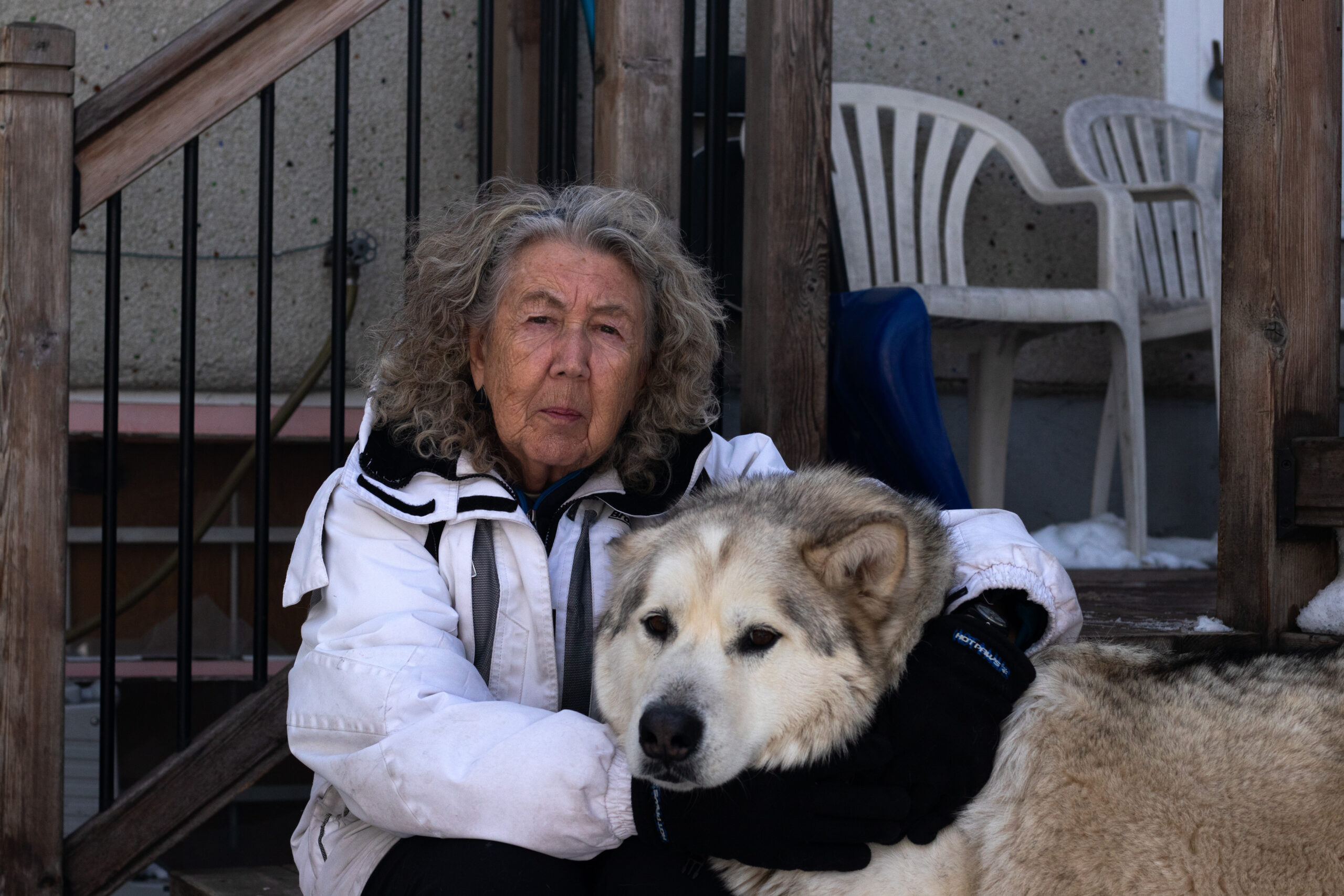
Lorna Thomas and her dog, Toby, are frustrated with the development of a row house next door. // Photo: Julie Patton
With the building still under construction, Thomas does not know what to expect once people move in. With the back of the row house facing her property, she is concerned that air conditioners — for the four top floors units — will line the building, all humming above her backyard.
Other concerns she brought up include water drainage — with the row houses occupying 60 per cent of the lot and cement walkways occupying additional land, will water and snow be properly absorbed into the soil, or will it run onto her property?
With all the trees removed from the property, she wonders if the builder will plant more. She knows there is no space behind the row house for trees, which might have provided her backyard with more privacy. With little room at the front either, will any planted greenage provide enough shade to convince her new neighbours to refrain from using air conditioning?
One fear Thomas does not have is that of her other neighbour selling to a developer.
“He’s not interested in selling, and he doesn’t even live there,” she said.
“It’s too late to do anything about my property, but I hope that they will not put through what they are proposing,” Thomas said regarding the proposed city-wide rezoning.
Over the past couple of years, Rutland Park, Thomas’ neighbourhood, has seen new development. However, to build medium density housing in the RC-1 neighbouhood, developers have had to submit a rezoning application to change the zoning designation of the lot.
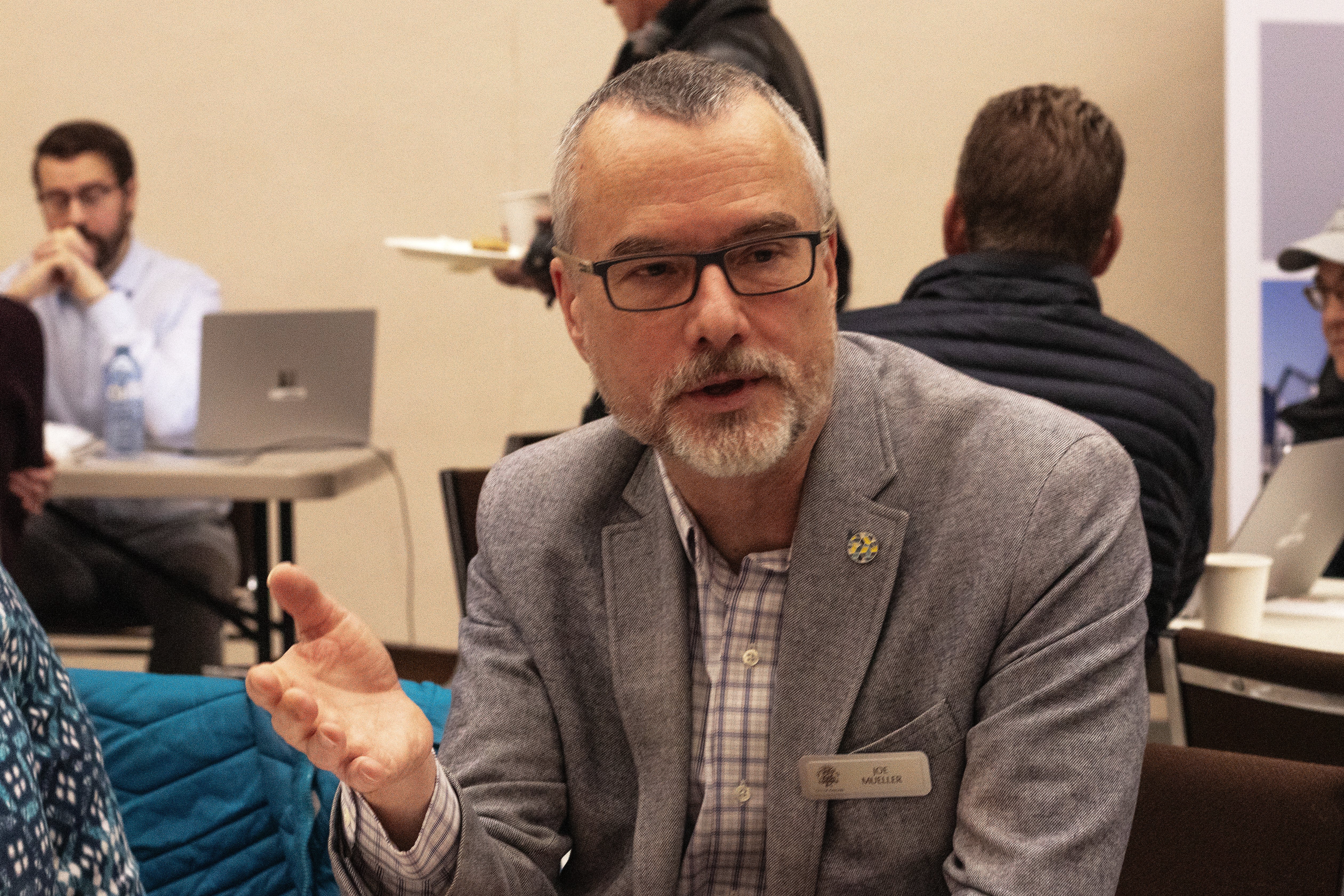
City planner Joe Mueller talking with citizens at Rezoning Info Session // Photo: Julie Patton
However, it is not a process one would describe as easy.
“There’s a cost involved with changing the land use of one’s property. It takes time, let’s say about four to six months. Time’s money, I’ve heard. And there’s a city fee that must be paid for that,” said Joe Mueller, a planner for the city.
“It’s roughly, for a standard 50-foot long, about $5,000. But that only assumes you’re doing everything yourself,” he said.
“What if you need a consultant to help you do that planning? As the applicant proposing, you also have to engage your neighbors. That takes time and money too. So we’re adding a cost to that. That could be quite important to individual families trying to improve the situation for themselves,” Mueller said.
Individual families are not the only ones who will see the benefits of that process being streamlined.
Dave White, founder of the urban planning and design studio CivicWorks, views removing the requirement for council approval to rezone individual properties as a direct benefit for Calgary developers. He believes it will greatly decrease the time it takes for a development to actually begin.
“What we’re talking about is going from several months, to several weeks,” White said.
What is blanket rezoning?
“Blanket zoning in essence, unlocks a type and intensity of development that’s not otherwise allowed by zoning in the city, unless one makes an individual site-by-site application,” said White.
With the city’s current infrastructure, he added that there is no concern over a lot designed for a single-family home supporting higher density housing.
“The infrastructure in the City of Calgary is pretty robust and it’s designed to handle a lot more density than it currently allows for,” he said.
“If there are parts of the road network, the pipe servicing, or the stormwater drainage system that need upgrading, there are really clear steps and systems and responsibilities for making those improvements before developments are approved. So it’s a very, very thorough, thoughtful system.”
Not all Calgary residents view the streamlining of this process as a positive change. Tony Morris, co-president of the Calgary River Communities Action Group, spoke out against the blanket rezoning at the original three-day committee meeting on the Housing Action Plan in September of 2023. He believes the change represents the city council “getting out of the business of helping to evolve these communities.”
“They don’t want to have that zoning process in place. They don’t want to have the City Council public hearings that the rezoning process requires. They want to allow for developers to evolve these communities,” Morris said. “If you’re telling me that an eight-plex can go anywhere, why am I here? You’re telling me we effectively have no input whatsoever.”
The City of Calgary attempted to inform the public through a number of both in person and online information sessions in 2024. Some discrepancy in messaging occurred between the two types of sessions, especially on the subject of property value. When presenting in the online forum, land development permit manager Arysha Lalach responded to an attendees question regarding the potential effects of the rezoning plan on property values.
“If every property is also R-CG, it doesn’t add value to one neighbourhood over the other. Its more equitable when it’s applied city wide.”
Notably, the blanket rezoning has not been cleanly applied city wide. Specific portions of the city, such as large swaths of Upper Mount Royal, do not fall under new zoning regulations.
Both Lalach online, and Mueller in person communicated during the sessions that no research found rezoning itself to lower the value of the property. Lalach did recognize that while the rezoning itself should not affect value, the increase in developments possible from new guidelines may do so.
“With more supply, buying those homes initially would just be less expensive,” Mueller said.
However, he made it clear that property value wasn’t a factor in their decision making process.
“The thing is, we’re doing it as a planning consideration. Property value is not something we consider because it’s the free market that decides property values.”
Another common point of discontent with attendees at both in person and online info-sessions was feeling a lack of agency throughout the process, something Morris agrees with.
“Those are big, profound changes, I don’t recall anybody in the last election cycle mentioning blanket upzoning at all,” Morris said. “There should be a public mandate. Either you run an election where it’s a major election issue and you hear from our councillors, or you take it to the people and you make your case.”
A public mandate in the form of a plebiscite is something that Morris himself had brought up as early as the original September committee meeting, and has continued to be brought up by Calgarians attending information sessions. The idea garnered enough support for six councilors to co-sign a motion putting the re-zoning rules to a public vote. On March 13, the council voted against the plebiscite, leaving the final hearing on the issue for the original April 22.
“The blanket upzoning recommendation has been tucked into the belly of the Trojan horse of the affordability crisis. There is nobody that I’ve talked to that would ever say that this city doesn’t need more affordable housing. Absolutely we do. Everybody would like to see people in safe and appropriate accommodation without question,” Morris said.
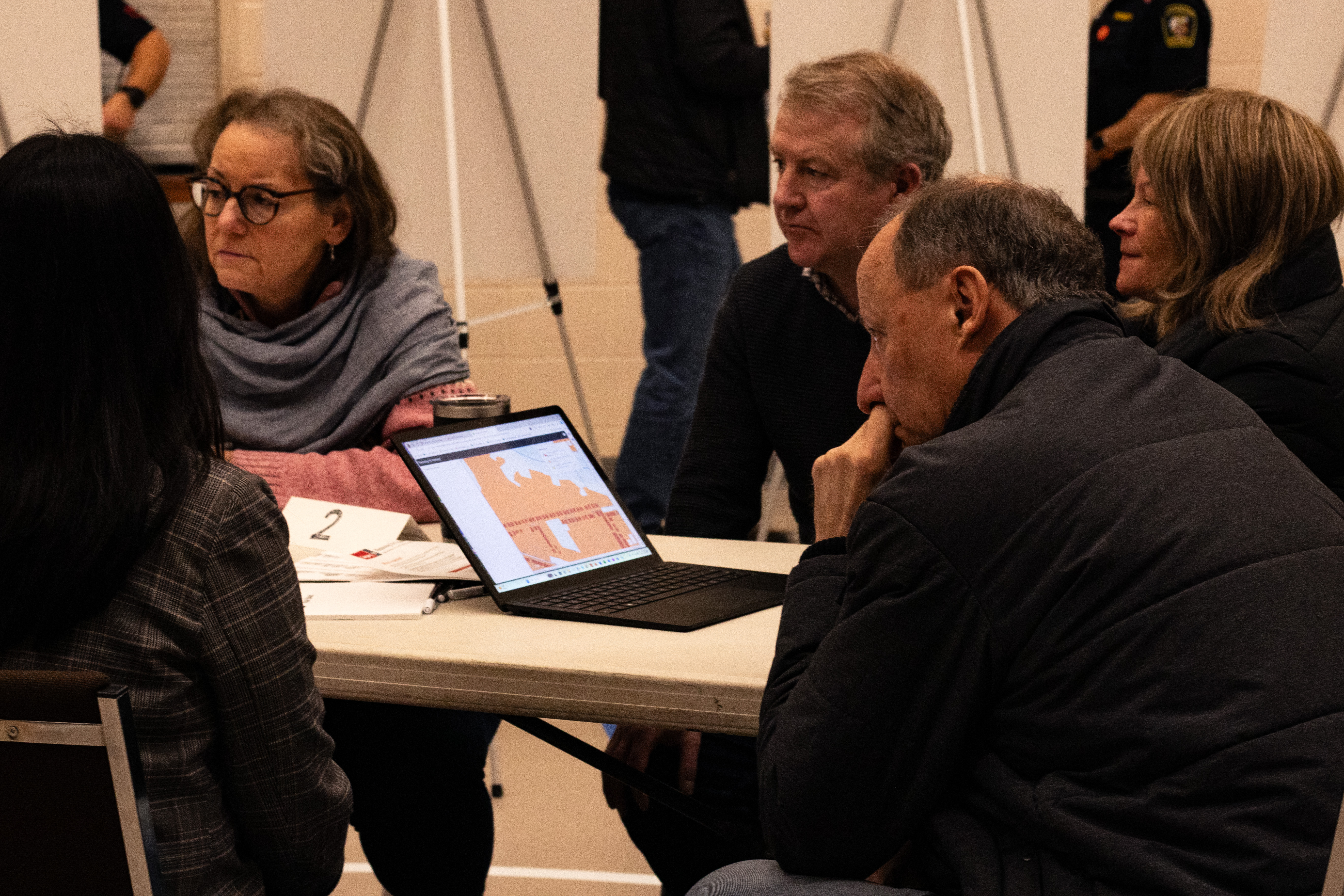
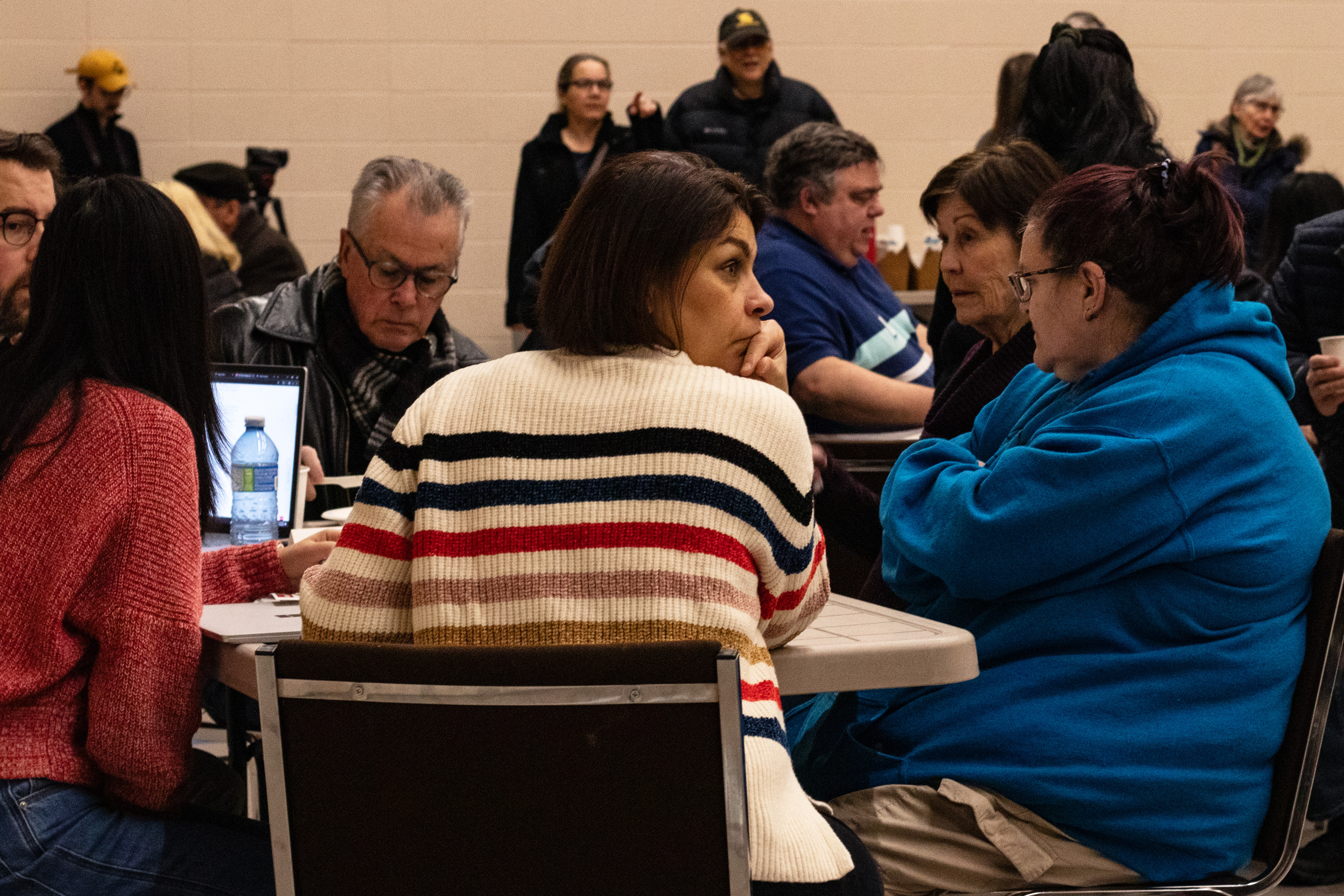
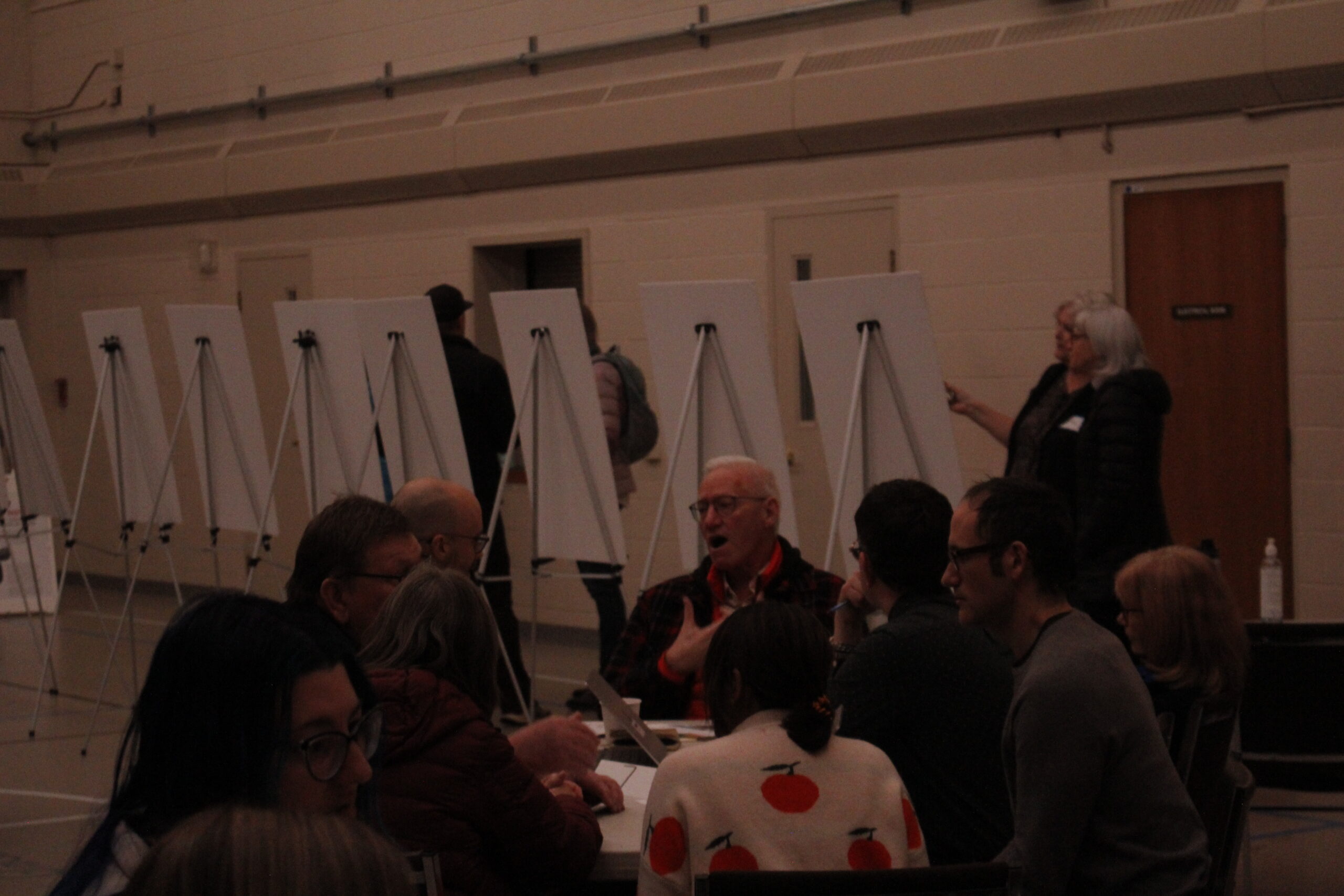
Citizens attending the City of Calgary’s public information session for rezoning on Feb. 10, 2024. // Photo: Julie Patton / Kobe Tulloch